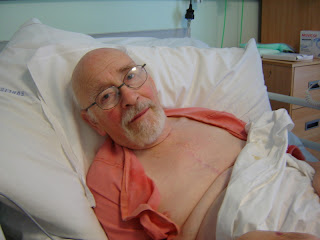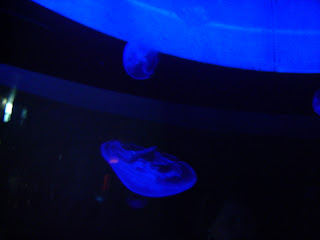My mother is a delightful, warm, kind person.
She is also very, very sociable. She likes nothing better than to be in a roomful of people, chatting and preferably dancing. She befriends everyone she meets. She can't wait in a queue for five minutes without exchanging phone numbers with the person she's next to. On a beach she'll join in with anyone's game of cricket or football. She will find out anyone's life story if she's with them for more than ten minutes, and then tell it to me later.
"That taxi driver who brought me home is doing a law degree. And he got married at twenty-three and he's got three children. He's from Wakefield originally - - " And I try to listen politely, though I've never met him and I'm just not interested and if that's my failing then it's my failing.
I'm not like that. I don't like large groups of people. My mother never, ever understood that when, as a child, I said "I don't want to go to the party," that was exactly, EXACTLY what I meant.
The other thing about my mother is that she was brought up by Victorians: my grandmother was born in eighteen-ninety-eight and my grandfather was born in eighteen-eighty-nine. So, as a child, she was never permitted to express a single negative emotion, because Victorians didn't. So although she's always, always incredibly kind, and always trying to help me, I have never seen her cry.
This combination of the tremendous sociability and inability to deal with emotions is driving me crazy when we go to visit the Communist in hospital.
I'm always busy, always short of time and so when, on the way through the hospital, she stops for ten minutes to befriend some child who's kicking a ball about, I find myself wanting to move on to get to see the Communist, and feeling guilty because of my impatience.
In the ward, she works her way round all the other elderly gentlemen on the ward, chatting to them all. They think she's wonderful. I am only aware that the Communist, who would like to talk to my mother above anyone else, is left talking to me while she does her Befriending thing.
Then the tea lady arrives and my mother finds out that she lives quite near us, and has twins, and a five-year-old, and how she gets to the hospital, and how long she's worked there and then the Communist says quietly "Talk to me while you're mother's nattering to her" and then I want to say to the tea lady, "Excuse me, could you please FUCK OFF because I DON'T CARE how many children you have, I am here to see the Communist and will you please stop talking to his wife during his precious visiting time."
But, of course, I don't, I just talk to the Communist and feel guilty for thinking it.
When we're about to leave, the Communist's eyes fill with tears because his wife and daughter are leaving and his leg is hurting.
"Now then, now then, don't cry, no crying," says my mother sternly, waving her finger at him.
Once we're out of the ward, I say to her, with more gentleness than I feel,
"Mum, if you're in hospital and you haven't been home for three and a half months and they're about to amputate your leg and you're in a lot of pain and you don't know if you'll live through the operation, and your loved ones are going home - - don't you think you're entitled to cry, just a bit?"
I can see that sink in and I can see how upset she is, and I feel guilty for saying it.
"Yes, but it's not the way I was brought up," she says.
"Well, try to change," I say, "you know that way was wrong."
She won't change because it's too late. Nothing to be done.
 Here's The Communist, who was looking very well today and who has moved to another ward, the surgical ward, where all the staff seem lovely and he's in a side ward.
Here's The Communist, who was looking very well today and who has moved to another ward, the surgical ward, where all the staff seem lovely and he's in a side ward. My friend David and did one of our one-day Escapes from Leeds today, and started walking in Kettlewell in the sunshine. It was freezing cold this morning, and there was a very strong wind, so we walked along the river to Starbotton, rather than trying to climb up onto the hills.
My friend David and did one of our one-day Escapes from Leeds today, and started walking in Kettlewell in the sunshine. It was freezing cold this morning, and there was a very strong wind, so we walked along the river to Starbotton, rather than trying to climb up onto the hills.
 Fortified with all that food, we found a path parallel to the road and walked back along it to Kettlewell, across moorland and woodland.
Fortified with all that food, we found a path parallel to the road and walked back along it to Kettlewell, across moorland and woodland. What a strange summer it's been. Weird weather, torrential rain, lots of flooding. Plenty of good things happening in our family, but all overshadowed by the Communist's illness.
What a strange summer it's been. Weird weather, torrential rain, lots of flooding. Plenty of good things happening in our family, but all overshadowed by the Communist's illness. A couple of stones and a gap.
A couple of stones and a gap.
 Strange objects drifting round in outer space, perhaps, with a blue moon in the background?
Strange objects drifting round in outer space, perhaps, with a blue moon in the background? Yes, the rocks in the picture really are the ones that the sign refers to. Scary rocks, eh? I expect the Health and Safety Inspector looked at the rocks and said oh, no, you can't have those rocks without a warning notice. Someone could fall off them and graze their knee, or get a very slight bruise.
Yes, the rocks in the picture really are the ones that the sign refers to. Scary rocks, eh? I expect the Health and Safety Inspector looked at the rocks and said oh, no, you can't have those rocks without a warning notice. Someone could fall off them and graze their knee, or get a very slight bruise.
 I think it's the idea that if ever you want to transport lots of stuff, you can. And it's that self-contained moveable-house thing that I love about narrowboats, too.
I think it's the idea that if ever you want to transport lots of stuff, you can. And it's that self-contained moveable-house thing that I love about narrowboats, too. Intrigued, I zoomed in for a closer look:
Intrigued, I zoomed in for a closer look: He's clearly been standing there for quite a while, looking down and holding his shorts up, - a tribute to Victorian decency, surely - and I've never seen him in my life, though I must have walked down that street hundreds of times. I'm not sure why he's there: is he a famous Leeds landmark that I've just never noticed?
He's clearly been standing there for quite a while, looking down and holding his shorts up, - a tribute to Victorian decency, surely - and I've never seen him in my life, though I must have walked down that street hundreds of times. I'm not sure why he's there: is he a famous Leeds landmark that I've just never noticed?  Both productions are very entertaining and enjoyable and tickets cost a fiver. I'll be on the door, taking the money, I think, since I've volunteered to help.
Both productions are very entertaining and enjoyable and tickets cost a fiver. I'll be on the door, taking the money, I think, since I've volunteered to help. and a different tractor towing a different boat:
and a different tractor towing a different boat:



 and Stephen and Emily and Gareth all chorused "Ah, Daphne loves those!" And they were right, I do, though I'd be hard put to say why.
and Stephen and Emily and Gareth all chorused "Ah, Daphne loves those!" And they were right, I do, though I'd be hard put to say why.